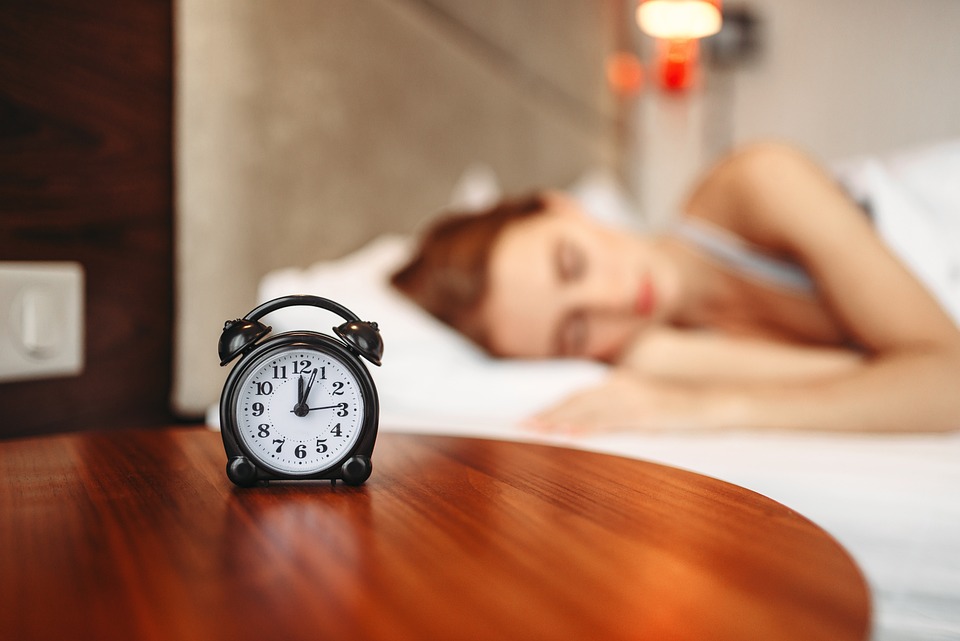
There are a few reasons why repeating the same quiet routine at night can help:
- It might help calm your overactive mind if you’re the kind of person who lies awake in bed thinking.
- You can plan for tomorrow so you don’t worry about it in bed.
- By repeating a regular pattern, you can train your body and mind to unwind and prepare for sleep.
- Many activities people do in the evening can be overstimulating. A bedtime routine helps you avoid those choices and relax instead.
What to do in your bedtime routine
The key is to create a routine that is quiet, relaxing, and enjoyable. This routine will differ from person to person. Some people might like to just do one activity, while others might like to combine two or more.
Here are some ideas you could try. You can choose to do any of them, or even a combination of them. It might be helpful to experiment with different options to see what works for you.
- Switch off your electronic devices
I think it’s important to consider giving up your screen time, even though it might be hard!
I’m one of the many people who love my electronic devices. They have a way of eroding our precious sleep time, though.
It might be best not to stare into a screen during 30 to 60 minutes before going to sleep for several reasons:
- The content can be mentally, and sometimes emotionally, stimulating.
- The light that some devices emit might affect your internal body clock. If you have to use your phone, at least put the blue light filter or night mode on, and dim the screen brightness.
- They can be addictive, eating into even more sleep time.
- Checking emails, the news, and social media at night can create worry and stress. There’s a reason the word ‘doomscrolling’ was invented…
I don’t want to be the party pooper who ruins everyone’s fun by telling them they can’t use their phone in bed. I know some people find it helpful to watch cute cat videos or play games before they go to sleep. If that’s what works for you and helps you relax, then I guess it’s okay to do it in moderation (even though I didn’t say that).
If you have sleep problems and spend a lot of time looking at screens, try not using screens at night for a week and see how it affects your sleep.
- Do a simple relaxation exercise or meditation before bed
In a survey of 2000 readers of this website, 58% said they couldn’t fall asleep because they were too busy thinking. Another 24% similarly said it was worry, stress, or anxiety that keeps them up.
If you’re finding it difficult to fall asleep, try doing a relaxation exercise before bed, or even when you’re already in bed.
Personally, I try to meditate every night before bed, even if it’s just for five or ten minutes. Here’s a little routine I’ve developed that I find relaxing and you can easily squeeze into just a few minutes:
- Dim the lights or light a candle to create some atmosphere.
- Sit cross-legged on the floor or lie comfortably.
- Breathe slowly and deeply into your belly five times: in through the nose, out through the mouth.
- Think of three things you’re grateful for today (this is a great technique to improve your mood).
- Tell yourself that the day is over now. Forgive yourself for any mistakes, bad thoughts or ‘failings’. Forgive others too. Then tell yourself that it’s all in the past.
- Breathe deeply a few more times, mentally following your breath out of your mouth, into the room, and beyond (this helps get yourself out of your busy head).
I find that doing this routine for ten minutes helps me to relax and feel better before going to bed. The gratitude and forgiveness practice is especially effective for clearing your head and ending the day on a positive note.
- Meditating not your thing? Go for a walk or spend time outside
Although meditation isn’t for everyone, there are still other ways to relax before bed. One way is to go for a walk outside. Walking can be very relaxing and it gives you a chance to clear your mind before bed.
Whether you have a garden, balcony, or just access to a community space, you can relax before bed by sitting outside and breathing in some fresh air.
- Read a book
This is probably my preferred technique as I frequently fall asleep with the book in my hand. This tells me that either reading works or I have a habit of choosing incredibly boring books. Whatever the case, it’s much more likely to send me to sleep than staring into my phone.
Should you have a tranquil spot to read in your residence prior to bed, it may be beneficial to do so with a beverage that will relax you. This can be especially advantageous during the summer or if you sleep hot, as your mattress will feel cooler than if you lie on it reading for an extended period before attempting to sleep.
It doesn’t matter where you read, as long as you’re engrossed in the book.
While I myself prefer old-fashioned paper books, I don’t mind if others prefer to read from a Kindle or other screen reader.
- Write down your worries and reminders for the next day
If you find yourself worrying about things you need to do and struggling to fall asleep at night, you’re not alone. It’s common to have trouble sleeping when you’re stressed about upcoming deadlines or events.
One way to reduce stress before bedtime is to make a list of worries and things to remember for the next day. This allows you to fall asleep without trying to remember everything, as it will all be waiting for you in the morning.
- Write down three things that went well that day, and three things that didn’t.
Each day, reflect on what went well. This will help you move on from what went wrong and appreciate the progress you are making. Be grateful for what you have.
There is also value in acknowldeging what went wrong. By taking a step back and looking at what can be improved, you can make small changes before they turn into big problems.
Seeing how you can make small improvements each day will help you stay on track. But make sure to take a few minutes each day to both acknowledge the things you did well and recognize the things you could improve on.
- Take a hot shower or soak in the bath.
The purpose of bedtime routines is to relax and de-stress. On nights when you need extra help loosening up and calming down, a hot shower can be helpful.
A lot of people say they think more clearly when they’re in the bath. Being in water is known to be very therapeutic and can help you disconnect from technology. Water calms your mind so your thoughts can become more fluid and your ideas have a chance to form. Try it! You might have your “aha moment” while you’re covered in suds.
- Stretch.
Do you feel tired and achy by the end of the day? Maybe it’s time to try stretching, to get you loose and limbered up for a good night’s sleep. Taking a few minutes to stretch lets your body know it’s time to start winding down.
Go to a quiet place in your apartment or home and notice how you feel physically. You probably need to stretch your shoulders, back, and legs if you sit in an office chair all day. Stretching helps you prevent injury and feel your body. It also relieves tension and stress.
- Spend time with someone close to you.
Laura Vanderkam, the author of What the Most Successful People Do Before Breakfast, recommends talking about your day with someone who matters to you as a great way to de-stress, reflect, swap stories, and recharge.
Having someone to rely on and confide in is crucial for a healthy and fulfilling life. Whether it’s catching up with a friend, spending time with family, or talking to your partner, making time for meaningful conversation is an important way to reduce stress and feel supported. Research has shown that simply petting an animal can also help lower blood pressure and anxiety levels, so even if you don’t have close friends or family nearby, spending time with a furry friend can be beneficial. Surrounding yourself with people or animals you care about is a great way to end your day on a positive note.
- Make tomorrow’s to-do list.
Compose a to-do list before going to bed in order to have a more relaxing sleep as you will have already written down what you need to do the next day.
After you wake up, you’ll have a good idea of what your day will be like.
- Visualization.
Successful people share the ability to see themselves achieving their goals. After getting clear on where they want to go, they keep that image in their mind.
Writing down your goals before bedtime makes them more likely to happen because they are in your subconscious while you sleep. Author of Think and Grow Rich, Napoleon Hill, calls this “envisioning your Chief Aim.” Imagine your chief aim as the mission statement of your primary purpose in life.
It is beneficial to take time before bed to visualize your goals and dreams in order to activate your creative subconscious. Keeping a notepad by your bed will allow you to write down any new and exciting ideas that come to you while you sleep.
- Have a relaxing drink or light snack
You should avoid caffeine, alcohol, and sugary drinks before bed. But drinking herbal tea or other decaffeinated drink is a good way to relax before bed.
If you are feeling hungry at night it is okay to have a small snack before going to bed. Try to make it something healthy and light like a banana, yogurt, cottage cheese on toast, or some nuts or berries.
- Spiritual practice, prayer, or yoga
If you find that engaging in spiritual activity before getting into bed brings you peace and clarity of mind, then doing it is an ideal time.
No matter what your favorite relaxation activity is, you can work it into your bedtime routine. This could mean reading religious texts before sleep, saying prayers, doing some light yoga, or taking time to meditate.
- Keep your bedroom temperature comfortable
It would be ideal if there were a perfect bedroom temperature that everyone could agree on that would help everyone sleep better. However, people have different comfort levels and preferences. Some people like the bedroom to be cool, while others prefer a warmer temperature.
Some sleep experts say a lower temperature is better for sleep. They suggest a temperature of 66 degrees Fahrenheit (19 degrees Celsius) to 70 degrees Fahrenheit (21 degrees Celsius).
I think the temperature range is a good starting point, but it is more important to be aware of how warm or cool you sleep best.
I am very particular about the temperature in my bedroom and will do whatever it takes to make it comfortable. I also like to do a comfort check when I first get into bed. If I’m uncomfortable because it’s too hot or the bedding isn’t right, I’ll get up and fix the problem instead of lying in bed and hoping I’ll fall asleep.
Here are a few steps you can take to keep the temperature comfortable:
- Set your home and/or bedroom thermostat to the temperature you sleep best in.
- Open windows to clear out any hot, stuffy air.
- Have a shower 15 to 30 minutes before bed, preferably not a very hot one.
- If you have a hot bath, make sure it’s at least an hour before bed. It takes a long time for the body to cool down after a bath.
- Go for a short walk outside to get some fresh air.
- If you live somewhere very hot, try a cooling mattress pad or bed fan.
- Planning for plenty of sleep.
In conclusion, those who are successful plan their days and nights around getting enough sleep. They understand that running on little to no sleep will result in feelings of irritability and exhaustion, as well as impact their mental state. Sleep deprivation has been linked to serious health conditions such as high blood pressure, heart disease, and stroke.
The National Sleep Foundation recommends that adults sleep for between seven and nine hours per night. Having a regular bedtime helps your body to establish a sleep rhythm so that your sleep is more restorative. If you stick to the same routine each night, your body will become used to it and will know when it’s time to relax. Eventually, it will become easier to fall asleep.
Do you feel drowsy yet? Is a yawn coming on? Have a good night’s sleep.














